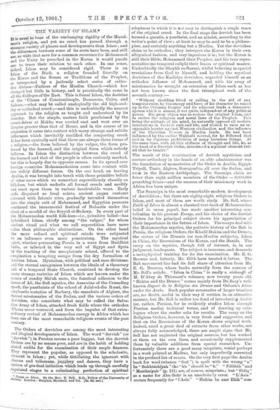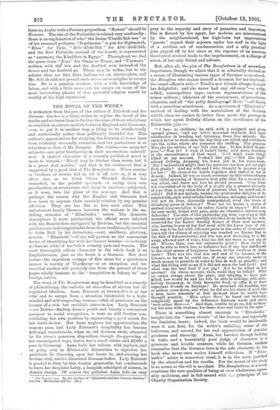THE VARIETY OF ISLAM.*
Is is usual to hear of the unchanging rigidity of the man's religion, and yet no. creed has passed through a ata�nger variety of phases and developments than Islam ; and the differences between some of its sects have been, and still are, so wide that save for a common reverence for Mohammed and the Unity he preached in the Koran it would puzzle one to trace their relation to each other. In one sense, indeed, Islam may be considered rigid. There is an Islam of the Book, a religion founded literally on the Koran and the Sunna or Traditions of the Prophet, as interpreted by a jealously select series of ortho- dox divines—Fathers of the Muslim Church—which has changed but little in history, and is practically the same in all the Colleges of the East. This is Sunni Islam, the doctrine of the eljlams, of Constantinople, Damascus, Cairo, and Lahore.—what may be called analogically the old high-and- dry or cathedral creed ;—and this is undoubtedly the nearest approach to the religion as taught and understood by its founder. But the simple, austere faith proclaimed by the camel-driver at Mekka was carried east and west over an Empire greater than that of Rome, and in the course of its migration it came into contact with many strange and subtile influences which inevitably modified the conquering creed. It has been cynically said that there are always three forms of a religion,—the form believed by the vulgar, the form pro- fessed by the learned, and the original form which nobody believes. In Islam the distinction between the creed of the learned and that of the people is often curiously marked, but this is largely due to opposite causes. In its spread over foreign countries Mohammedanism came into contact with two widely different forces. On the one hand, on leaving Arabia, it was brought into touch with those primitive beliefs of other races which we somewhat superciliously classify as folk-lore, but which underlie all formal creeds and modify and react upon them in various incalculable ways. Early gods disguised as local saints, ancient pagan customs coloured with Islamic rites, gradually intruded themselves into the simple cult of Mohammed, and Egyptian peasants continued the immemorial festival of Bubastis under the cloak of a moolid of the Seyyid el-Bedawy. In every part of the Mohammedan world folk-lore-i.e., primitive belief—has hybridised Islam, chiefly among "the vulgar," for whom .:Incient ritual and what we call superstition have more value than philosophic abstractions. On the other hand the more refined and spiritual minds were subjected to an influence even more penetrating. The mystical spirit, whether permeating Persia in a wave from Buddhist India, or infected in the very soil of Egypt and Syria by the teaching of the neo-platonic school, offered to the unagination a tempting escape from the dry formalism of Arabian Islam. Mysticism, with political and race divisions, and the eternal antagonism between the ideals of a theocracy and of a temporal State Church, combined to develop the many strange varieties of Islam which are known under the names of sundry Shi`ah sects, the fanatical adhesion to the house of Ali, the Sufi mystics, the Assassins of the Crusading 5poch, the pantheists of the school of Jalal-ed-din Rumi, the corybantic ecstatics of Barbary, the marabuts of Algiers, the Sauusi missionaries of the Sudan, and the various orders of dervishes, who constitute what may be called the Salva- tion Army of Islam, attacked fresh fields where the orthodox illama never ventured, and form the impulse of that extra- ordinary revival of Mohammedan energy in Africa which has been one of the most remarkable religious events of the past century.
The Orders of dervishes are among the most interesting and illogical developments of Islam. The word " dervish" (or
darwish") in Persian means a poor beggar, but the dervish Orders are by no means poor, and are in the habit of holding stated audits for the examination of their ample finances. They represent the popular, as opposed to the scholastic, element in Islam ; yet, while tittillating the ignorant with Alarms and talismans, jugglery and dances, they have a system of gradual initiation which leads up through carefully regulated stages to a culminating perfection of spiritual • Eames ea /slam. By the Bev. E. Sell, B.D., Fellow of the University of sluing. London : Simpkin„llfershall, and Co. De. dd. net.] adeptness in which it is not easy to distinguish a single trace of the original creed. In the final stage the dervish has been
termed a gnostic, a pantheist, and an atheist, according to the writer's point of view ; at least he may be said to be a philoso- pher, and certainly anything but a Muslim. Yet the dervishes claim to be orthodox ; they interpret the Koran in their own allegorical fashion, and very ingenious it is ; but the Koran is still their Bible, Mohammed their Prophet, and his true repre- sentative (no temporal caliph) their Imam or spiritual master. Undoubtedly the Sheykh es-Sanusi, whilst believing in special revelations from God to himself, and holding the mystical doctrines of the Kadiriya dervishes, regarded himself as an orthodox follower of Mohammed, and with his army of missionaries he wrought an extension of Islam such as has not been known since the first triumphant rush of the seventh century :-
"Without shedding blood or calling in the aid of any temporal ruler, by the energy and force of his character he raised up in the Ottoman Empire and its adjacent lands a theocratic system which is almost, if not quite, independent of any political power. His great object was to restore the original Islam, and to revive the religious and moral laws of the Prophet. This being the attitude of his mind, be naturally opposed all modern innovations in Turkish rule and life, and wished to raise an in- superable barrier against Western civilisation and the influence of the Christian Powers in Muslim lands. He had been influenced by the earlier Wahhabi revival, for he followed that sect in its vigorous prohibition of many harmless things. At the.same time, with all this stiffness of thought and life, he, as the head of a Darwish Order, introduced a mystical element into all that he taught."
The result of this combination of dervish mysticism and austere orthodoxy in the hands of an able administrator was the foundation of monasteries of the Order in Arabia, Egypt, Tripoli, Tunis, Algiers, Senegambia, all over the Sudan, and even in the Eastern Archipelago. The Sanusiya claim no fewer than eight million members of the Order — 8,000,000 preaching friars—and the success of their missionary work in Africa has been unique.
The Sanusiya is the most remarkable modern development of dervishism ; but there are eighty-eight religious Orders in Islam, and most of them are worth study. Mr. Sell, whose Faith of Islam is almost a classical text-book of Mohammedan belief in usum populi, has made another interesting con- tribution in his present Essays, and his choice of the dervish Orders for his principal subject shows his appreciation of their importance in the fature of Islam. The essays deal with the Mohammedan mystics, the pathetic history of the Bab in Persia, the religious Orders, the Khalif Hakim and the Druses,
the status of the Zimmis (or non-Muslim subjects), Islam in China, the Recensions of the Koran, and the Hanifs. The essay on the mystics, though full of interest, is, in our judgment, inadequate. The subject is immense, and demands
a metaphysical training for its due examination. Mr. E. G. Browne and, latterly, Mr. Gibb have treated it better. The Bab movement has had its full share of attention from Mr. E. G. Browne, whose books naturally form the sources of Mr. Sell's article. " Islam in China " is really a reehauffg of M. D'Abry de Thiersant's volumes, now twenty years old.
" Hakim and the Druses " comes mainly from De Sacy's well- known Exposis de in Religion des Druses and Osborn's Islam.
under the Arabs. Such popular summaries of larger treatises are, no doubt, useful in their way if written in an attractive manner, but Mr. Sell is rather too fond of introducing Arabic (or, rather, Persian, for he evidently studies Islam through
Persian media) technical terms, and of drawing up cata- logues where the reader asks for results. The essay on the Religious Orders, however, is very fresh and suggestive, and that on the Recensions of the Koran shows original work. Indeed, amid a great deal of extracts from other works, not always fully acknowledged, there are ample signs that Mr. Sell has not neglected the original sources, but has worked at them on his own lines, and occasionally supplemented them by valuable additions from special researches. lin.
fortunately there are a good many misprints, venial perhaps in a work printed at Madras, but only imperfectly corrected in the prefixed list of errata. On the very first page the Arabic
book for wool (whence " Sufi ") is spelt with the wrong " s." In " Bakhttishiyah " the " kh " should be " k." " Fatikih " and " Maulaniyah " (p. 111) are, of course, misprints ; but " Sidiq" as a name for Abn-Bekr is an unscholarly error. " L'Asia "
occurs frequently for " l'Asie." "Hakim ba amr IDfih" con-
fuses an Arabic with a Persian preposition. " Nowari" should be Nowairi. The rise of the Fatimides is related very confusedly ; there is no explanation of who " the Imam (Ubaidu'llah was " or of his assumed pedigree, " Segelmessa " is put for Sigilmasah, " Elisa " for Ilyas, " Abli-‘Abdu'llah " for Abfi-`Abdi'llith, and the first Fatimide, instead of the fourth, is represented as "assuming the Khalifate in Egypt." Throughout we find the queer form "'Ilmr" for 'Omar or ellmar, and "‘IImmaya" written with th; 'airs and the doubled mim instead of the hemza and the doubled ya. These may be trifles, but to the scholar they are like false hall-marks on electro-plate, and Mr. Sell should not permit such errors or oversights to escape him. He is a genuine student, with a wide knowledge of Islam, and with a little more care his essays on some of the most interesting phases of that powerful religion would be worthy of his high reputation.















































 Previous page
Previous page